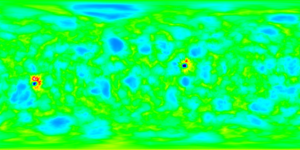Difference between revisions of "Moho/pl"
| Line 19: | Line 19: | ||
|sidv=0.7 | |sidv=0.7 | ||
|SoI=11206449.176644 | |SoI=11206449.176644 | ||
| − | |atmosyorn= | + | |atmosyorn=Tak |
|atmoskPa=0.507 | |atmoskPa=0.507 | ||
|atmosh=17000 | |atmosh=17000 | ||
| Line 26: | Line 26: | ||
|T-maxC=3069.28 | |T-maxC=3069.28 | ||
|T-maxK=3342.43 | |T-maxK=3342.43 | ||
| − | |O2yorn= | + | |O2yorn=Nie |
}} | }} | ||
| − | '''Moho''' jest planetą najbliższą centralenj gwieździe systemu - [ | + | '''Moho''' jest planetą najbliższą centralenj gwieździe systemu - [http://kspwiki.nexisonline.net/wiki/Kerbol/pl Kerbol]. Jest również najmniejszą planetą, ale nie jest najmniejszym ciałem niebieskim. Jest również jedyną planetą w [http://pl.wikipedia.org/wiki/Obr%C3%B3t_synchroniczny synchronicznej rotacji] z [http://kspwiki.nexisonline.net/wiki/Kerbol/pl Kerbol] i jedyną planetą bez naturalnych satelitów. |
Due to its close proximity to Kerbol, the atmosphere, while thin, is debilitatingly hot. Rockets overheat easily, making a high thrust-to-weight ratio and/or a heat-resistant rocket design necessary for a safe landing. | Due to its close proximity to Kerbol, the atmosphere, while thin, is debilitatingly hot. Rockets overheat easily, making a high thrust-to-weight ratio and/or a heat-resistant rocket design necessary for a safe landing. | ||
Revision as of 09:35, 1 November 2012
Moho jest planetą najbliższą centralenj gwieździe systemu - Kerbol. Jest również najmniejszą planetą, ale nie jest najmniejszym ciałem niebieskim. Jest również jedyną planetą w synchronicznej rotacji z Kerbol i jedyną planetą bez naturalnych satelitów.
Due to its close proximity to Kerbol, the atmosphere, while thin, is debilitatingly hot. Rockets overheat easily, making a high thrust-to-weight ratio and/or a heat-resistant rocket design necessary for a safe landing.
Contents
Topography
The surface is very mountainous, with surprisingly few craters. The crust almost looks fractured. Up close it is much redder than in the map view and has many white dots. There are two volcanoes (Shown as red circles in the topographic map) on Moho.
Atmosphere
Moho has a very thin, very hot atmosphere that poses a heat threat to most or all rocket motors. It extends to an altitude of approximately 17,000 meters. Some aerobraking is possible, though the terrain makes this risky — even reaching an atmosphere as thin as 0.00001 atm (equivalent to 57.5 km altitude on Kerbin) requires flying at 12.5 km, below the height of Moho's tallest peaks. During dawn and dusk, the sky is bluer instead of the normal red.
Like all atmospheres in the game, Moho's atmosphere fades exponentially with increasing altitude (with a scale height of 2000 m). In general, the atmospheric pressure on Moho at an altitude expressed in meters is:[1]
Orbital Statistics
Geosynchronous orbit around Moho is not possible — it would require an altitude of 0,00 m, outside of Moho's sphere of influence.
For a semisynchronous orbit of ½ Moho day (307.75 hours or 1,107,882 seconds) an orbit of 0,00 m above Moho is needed with a velocity of 0,00 m/s.
Reference Frames
Rotational/Inertial transition: ? m
| Warp | Minimum Altitude |
|---|---|
| 5x | 10 km |
| 10x | 10 km |
| 50x | 30 km |
| 100x | 50 km |
| 1,000x | 100 km |
| 10,000x | 200 km |
| 100,000x | 300 km |
Gallery
Changes
- Initial Release
Notes
- ↑ A nuclear engine has a specific impulse of 220 in 1 atm, 800 in vacuum, and the following at various Moho altitudes. (When descending into a Moho volcano, the altitude indicator begins to climb again after reaching 0, presumably representing negative numbers.)
altitude (m) -1237 -1015 -800 26 97 146 270 488 1042 1406 1994 2886 3865 4816 5655 8150 specific impulse 794.5 795.1 795.6 797.1 797.2 797.3 797.5 797.7 798.3 798.6 798.9 799.3 799.6 799.7 799.8 800.0


